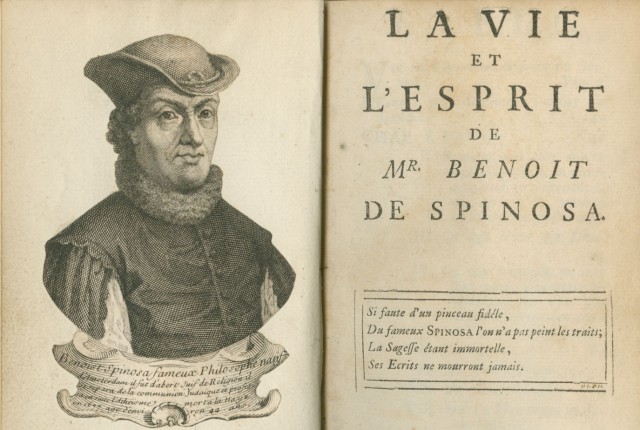
Date/Time
Friday, March 4, 2016–Saturday, March 5, 2016
All Day
Location
UCLA Royce Hall, Room 314
10745 Dickson Plaza
Please note that the Clark Library is closed for renovations.
In 2015–16 all events are being held on UCLA’s main campus.
—a conference organized by Margaret Jacob, University of California, Los Angeles; Gianni Paganini, Università del Piemonte Orientale; and John Christian Laursen, University of California, Riverside
co-sponsored by the UCLA Department of History; Università del Piemonte
Orientale, Vercelli; and Centro di Ricerca della Accademia dei Lincei, Rome
The clandestine manuscript represents a genre of philosophical communication very particular to and typical of the early modern era. The archetype of the genre was Jean Bodin’s Colloquium heptaplomeres of 1588. In the following years some 250 texts in some 2,000 manuscript copies circulated around Europe, where they are now found in both public and private libraries. After Bodin’s prototype, the purest model of the genre was the 1659 Theophrastus redivivus, which, at a relatively early date, became the model of the clandestine philosophical tract in all of its most radical aspects: rigorously anonymous (we still do not know the author); rationalist criticism of philosophy and religion, drawing on all of the classical and Renaissance alternative traditions; and critical readings of the standard texts of the official culture in order to bring out their errors and ideological sleight of hand.
The clandestine manuscripts formed a braid of underground currents beneath all of early modern philosophical culture, and many of the ideas expressed in them emerged in print in the works of Voltaire, Hume, d’Holbach, and Diderot. From the era of the libertines to the full development of the Enlightenment, the clandestine manuscripts undergirded an age of important cultural changes. One cannot speak of a single current: rather, there were many currents, drawing on the skepticism of Montaigne and Bayle, the rationalism of Descartes and Malebranche, the metaphysics of Spinoza, the materialism of Hobbes, and the empiricism of Locke, among others. Above all, new paths of impact should be explored, in the conviction that European intellectual history must be read “between the lines” in the search for secret truths underneath the official professions of faith of the schools and of established authors. The greatest stage for the creation and flourishing of the most original clandestine texts was the period just preceding the “official” beginnings of the Enlightenment in the period from the publication of Montesquieu’s Lettres persanes in 1721 to Voltaire’s Lettres philosophiques in 1734. John Toland’s work was one apogee. By the time of Jean Meslier’s atheist testament of 1729, most of the important manuscripts had been written.
Speakers
Jeffrey D. Burson, Georgia Southern University
Sabrina Ebbersmeyer, Københavns Universitet
Karen Hollewand, University of Oxford
Jonathan Israel, Institute for Advanced Study
Inger Leemans, Vrije Universiteit Amsterdam
Whitney Mannies, University of California, Riverside
John Marshall, Johns Hopkins University
Gianni Paganini, Università del Piemonte Orientale
Winfried Schröder, Philipps-Universität Marburg
Maria Susana Seguin, Université Paul-Valery Montpelier III
Frederik Stjernfelt, Aalborg Universitet
Rienk Vermij, University of Oklahoma
Image
Jean Maximilien Lucas, d. 1697
Vie et l’esprit de Mr. Benoit de Spinosa, 1719
Title and facing pages (crop)
UCLA Library Special Collections
Program
Friday, March 4
8:30 a.m.
Morning Coffee and Registration
9:00 a.m.
Barbara Fuchs, University of California, Los Angeles
Welcome
Margaret Jacob, University of California, Los Angeles; Gianni Paganini, Università del Piemonte Orientale; John Christian Laursen, University of California, Riverside
Introductory Remarks
9:15 a.m.
First Session
Chair: Margaret Jacob, University of California, Los Angeles
Gianni Paganini, Università del Piemonte Orientale
“Renaissance Philosophy and Early Modern Clandestinity”
Winfried Schröder, Philipps-Universität Marburg
“Why, and to What End, Should Historians of Philosophy Study Early Modern Clandestine Texts?”
10:45 a.m.
Coffee Break
11:00 a.m.
John Marshall, Johns Hopkins University
“Islam, Toleration, and the Enlightenment: Debated Manuscripts and Print Debates in the Early Enlightenment”
Jeffrey D. Burson, Georgia Southern University
“The Polyvalence of Heterodox Sources and Eighteenth-Century Religious Change”
12:30 p.m.
Lunch
2:00 p.m.
Second Session
Chair: Gianni Paganini, Università del Piemonte Orientale
Inger Leemans, Vrije Universiteit Amsterdam
“Passions and Desires in Dutch Clandestine Circles, 1670–1720”
Karen Hollewand, University of Oxford
“Expert of the Obscene: Hadriaan Beverland and Sexual Manuscripts in the Late Seventeenth-Century Dutch Republic”
3:30 p.m.
Coffee Break
3:45 p.m.
Rienk Vermij, University of Oklahoma
“The Politics of the Libertines: The Role of Manuscripts in Heterodox Movements in the Early Eighteenth-Century Dutch Republic”
Whitney Mannies, University of California, Riverside
“Clandestine Language: The Style and Form of Radical Ideas”
5:15 p.m.
Reception
Saturday, March 5
8:30 a.m.
Morning Coffee and Registration
9:00 a.m.
Third Session
Chair: S. A. Lloyd, University of Southern California
Maria Susana Seguin, Université Paul-Valéry Montpellier III
“Clandestine Philosophical Literature and Academic Circles”
Sabrina Ebbersmeyer, Københavns Universitet
“The Role of Female Philosophers in the Radical Enlightenment”
10:30 a.m.
Coffee Break
10:45 a.m.
Jonathan Israel, Institute for Advanced Study
“The Revolution of 1820–23 in Spain and the Clandestine Philosophical Literature in Spanish”
Frederik Stjernfelt, Aalborg Universitet
“Conditions for Radical Utterances in 17th- and 18th-Century Denmark: The Clandestine Manuscripts of Kristoffer Dybvad as an Example”
12:15 p.m.
Closing discussion
12:30 p.m.
Program concludes
Booking Form
Bookings are currently closed for this event.

